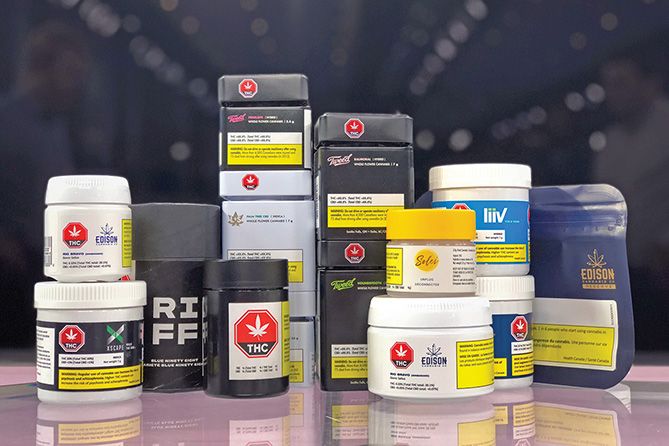(This story has been updated with analysis and more details.)
A subsidiary of cigarette maker British American Tobacco (BAT) and Atlantic Canada-based marijuana producer Organigram signed a 220 million Canadian dollar ($175 million) strategic collaboration with a focus on research and product development.
The deal is less about Canada and more about laying the groundwork to capitalize on the growing global marketplace for cannabinoid-based products and delivery systems, experts say.
It is also the kind of deal that is likely to manifest into similar investments into U.S. multistate operators (MSOs) if and when federal prohibition comes to an end in the United States, experts agreed.
“Global tobacco and alcohol giants are investing in Canadian LPs to understand cannabis markets and generate IP to deploy into U.S. markets, which is likely to manifest in similar investments into U.S. MSOs,” Max Mausner, a senior analyst at Vantage Asset Management in Toronto, told Marijuana Business Daily.
The BAT subsidiary acquired a 19.9% stake in Organigram by buying 58.3 million common shares at a price of CA$3.792, based on a five-day average price on the Toronto Stock Exchange, according to a news release.
BAT and Organigram have agreed to establish a Center of Excellence to collaborate on product development with an initial focus on CBD.
The center will be located at Organigram’s indoor facility in Moncton, New Brunswick, which holds the Health Canada licenses required to conduct research and development with cannabis.
The companies will form a steering committee to govern and supervise the project, consisting of an equal number of senior employees from both companies.
Under the agreement, both companies will have the right to independently commercialize the products, technologies and intellectual property created through the project globally.
US on horizon?
With some exceptions, global consumer packaged goods (CPG) companies have largely stayed on the sidelines in the cannabis industry because marijuana remains illegal at a federal level in most major global markets.
But that could change if the U.S. ends federal prohibition of the drug. Efforts are underway in the U.S. Congress to pass such legislation, but approval isn’t considered a sure bet anytime soon.
“I don’t think the market appreciates this British American Tobacco deal. BAT is an $85 billion market cap company – this $170 million deal for 20% of Organigram isn’t about Canada,” Mausner said.
Organigram said the deal fills its coffers with CA$220 million to deploy against its U.S. strategy.
“With the significant capital injection, Organigram is even better positioned to expand into the U.S. and further international markets at the appropriate time and subject to applicable law,” the company said in the release.
‘Natural fit’
Analysts viewed the Organigram-BAT collaboration in a positive light.
“Cannabis overall provides a natural fit for tobacco and a big incremental growth opportunity,” Jefferies analyst Owen Bennett wrote to clients.
He said the deal comes before possible entry of Organigram-BAT – “and possibly BAT” – into the world’s biggest market, the United States.
Bennett argued how it makes strategic sense for big tobacco to enter the cannabis space.
“Tobacco knows how to operate in a regulated environment,” he wrote.
“They have experience around growing a crop, and can even help shift many tobacco farmers over to cannabis, particularly for hemp CBD where outside grow is more common.”
In addition, he argued:
- There is probably less reputational risk nowadays.
- Tobacco has some of the most advanced vapor technology.
- Cannabis growth would be incremental with little threat of cannibalization of nicotine products.
Bennett compared the Organigram-BAT deal to past tie-ups between CPG companies and cannabis producers.
He noted that some CPG firms chose to spend billions of dollars to enter the cannabis space, while BAT did not pay any premium for the deal announced Thursday.
Alcohol giant Constellation Brands paid more than $4 billion for a stake in Canadian producer Canopy Growth, and tobacco company Altria shelled out $1.8 billion for its 45% stake in Cronos Group – with both CPG firms having warrants for majority control.
All about IP
In the case of BAT and Organigram, both companies will contribute background intellectual property to the research and development process at the Center of Excellence.
“And all of the IP developed through the Center of Excellence will be registered under ownership by BAT, but we receive a global royalty-free perpetual license. It made sense for one party to manage that,” Organigram CEO Greg Engel said in a phone interview with MJBizDaily.
“The way the deal is structured, each company is free to commercialize products in any market globally.”
The shared IP would essentially be the foundation for products that could evolve in different ways for the respective businesses, depending on a variety of factors.
Engel is not worried about the two companies potentially competing against each other with the IP they develop together.
“BAT is a major investor in Organigram with a 19.9% ownership,” he said. “Each company will have independence, but the steering committee that oversees the development will be in a position to look at commercial readiness of products.
“We both look at it from the perspective of creating the strongest products first, and the way we come to market would be very different in different markets and segments.
“In the near term in Canada, with THC-based products, we’d be sooner to market than they would.”
Matt Lamers is Marijuana Business Daily’s international editor, based near Toronto. He can be reached at matt.lamers@mjbizdaily.com.




